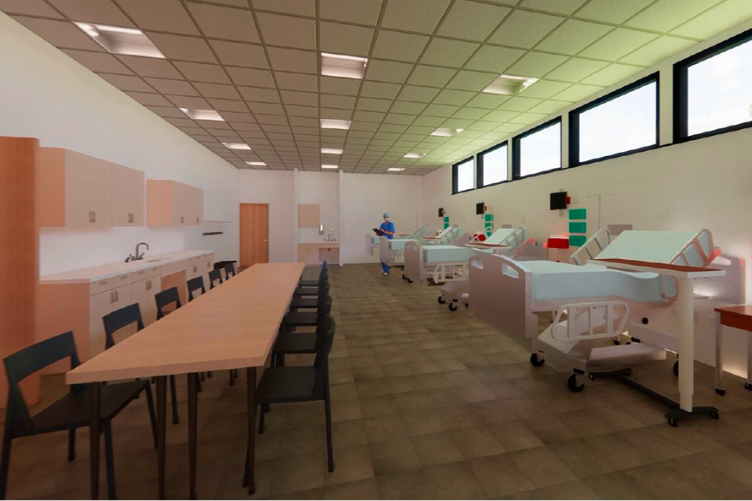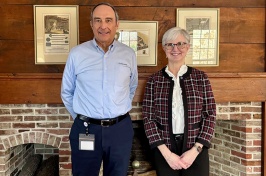
Rendering of one of several clinical labs in the Health Sciences Simulation Center. Photo courtesy of Lavallee Brensinger Architects.
In 2019, the State of New Hampshire provided $9 million to UNH to fund a health sciences initiative aimed at addressing the health care workforce shortages in the Granite State. That funding is being put to good use with the development of the College of Health and Human Services’ Health Sciences Simulation Center (HSSC), which will provide enhanced educational opportunities for students majoring in health and human services areas, including nursing, occupational therapy, athletic training and health sciences.
The HSSC will be comprised of more than 20,000 square feet and will house 35 offices, learning classrooms – and most importantly – fully equipped simulation labs that mimic hospital, clinic, primary care and other health care settings, giving students the experience of practicing in a setting with real equipment and technology.
“New Hampshire’s health care workforce shortage has become even more critical with the COVID pandemic and behavioral health crisis,” says Michael Ferrara, dean of the College of Health and Human Services. “The Health Sciences Simulation Center will allow us to bring together students in many disciplines to work in real-world clinical settings, promoting dialog, conversations and co-learning. This interprofessional approach is critical in preparing our students for more efficient and effective clinical internships and successful professional careers.”
Gene Harkless, associate professor and chair of the department of nursing, says that “while our commitment to interprofessional education was established decades ago, the new center will provide the next level of education that is invaluable in terms of bringing our students and faculty together in a high tech environment, ensuring that our students are maximally prepared and competent.”
“This partnership will help to address a significant health care workforce shortage in the state by expanding our academic programs and providing our students with the hands-on and diverse experiences they will need to succeed."
Students are embracing the interprofessional education concept. Occupational therapy graduate student Josh Routhier ’21, who hails from Kingston, New Hampshire, chose the profession for its holistic view of client care, and he emphasizes the importance of collaboration between health majors that rarely interact with one another in their respective curricula, but work closely together in the field. For instance, nurses, occupational therapists, nutritionists and other health professionals work with patients, and each other, to develop and execute care plans.
“Interprofessional education promotes a deeper understanding of each health care provider’s role for patient care, and how those roles blend together to create a truly comprehensive health care team that benefits patients and clients,” he says. “The Health Sciences Simulation Center will provide hands-on learning in a controlled environment to hone and develop skills that will directly translate to professional work in the field.”
UNH has made it a priority to promote and embrace diversity, equity and inclusion, and the HSSC is seen as playing an important role in that movement. Expanded efforts to incorporate those values into the academic curriculum will ensure that students are prepared to function and thrive in diverse settings – at UNH and in their lives post-graduation.

Occupational therapy graduate student Alyssa Stutzman ’21, who came to UNH from Hamden, Connecticut, says the HSSC will provide a unique opportunity to conduct more realistic simulation cases that look at how people’s cultures and beliefs change the way care is provided.
“It will give students an opportunity to work through cases that are realistic in clients’ intersectional identities and backgrounds,” she says. “The values of diversity, inclusion and equity are inextricably linked to the teaching and research mission at UNH, and these values are critical to development, learning and success. In addition, the center will foster the opportunity for students in health related majors to think about how we can make health care environments more accessible and equitable for people with physical and mental disabilities.”
Ferrara sees the HSSC as a vital building block to attract top-notch students into critically needed health care professions. It will be completed and operational in August 2021 – just in time to welcome both current and incoming UNH students for the fall 2021 semester. The nursing program, which has grown steadily over the past several years, will be expanded to accept even more students, with a goal of graduating 130 students from the bachelor of nursing program each year. Overall, through a phased growth approach, the HSSC will enable UNH to double the number of graduates in its health sciences programs.
“One of the university’s top priorities is to embrace New Hampshire and continue to build collaborations to support its economy and quality of life,” says UNH President James W. Dean, Jr. “This partnership will help to address a significant health care workforce shortage in the state by expanding our academic programs and providing our students with the hands-on and diverse experiences they will need to succeed as they prepare to provide care to residents of New Hampshire and beyond.”
-
Written By:
Callie Carr | UNH College of Health and Human Services | callie.carr@unh.edu | 603-862-0970
















































